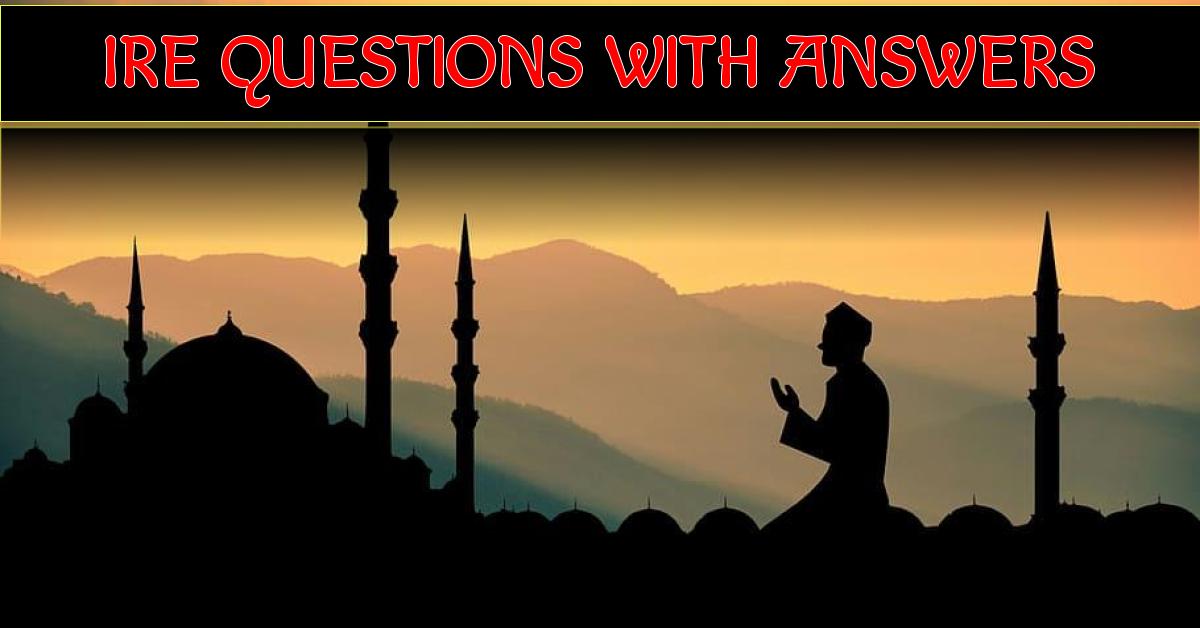KCSE IRE Paper 2 2012 Question 6(c) with Answers.(b) In what ways did Hassan-al-Banna contribute to the growth and development of Islam in the 20th century?. (10 marks)
Contributions of Hassan-al-Banna to the growth and development of Islam in the 20th Century.
0 Comments
KCSE IRE Paper 2 2012 Question 6(a) with Answers.(a) Discuss five contributions made by Muslim scholars to science. (10 marks)
Contributions of Muslim Scholars to Science.
KCSE IRE Paper 2 2012 Question 5(c) with Answers.(c) Highlight the importance of the treaty of Hudaibiya to Muslims. (5 marks)
Importance of treaty of Hudaibiya.
KCSE IRE Paper 2 2012 Question 5(b) with Answers.(b) What lessons can Muslims learn from the conquest of Makka in 630 A.D? (7 marks)
Lessons Muslims learn from the conquest of Makka in 630 AD).
KCSE IRE Paper 2 2012 Question 5(a) with Answers.(a) State the contributions made by the Abbasids towards the development of Education. (8 marks)
Contributions made by the Abbasids towards the development of Education.
KCSE IRE Paper 2 2012 Question 4(b) with Answers.(b) Elaborate on five challenges faced by Sayyidna Uthman Ibn Affan during his caliphate. (10 marks)
Challenges faced by Sayyidna Uthman Ibn Affan during his caliphate.
KCSE IRE Paper 2 2012 Question 4(a) with Answers.(a) Discuss the influence of Islam along the coast of East Africa in the nineteenth century. (10 marks)
Influence of Islam along the coast of East Africa in the nineteenth century.
KCSE IRE Paper 2 2012 Question 3(c) with Answers.(c) Identify four legitimate sources of earning. (4 marks)
Legitimate sources of earning.
KCSE IRE Paper 2 2012 Question 3(b) with Answers.(b) Explain the effects of domestic violence on the family.(6 marks)
Effects of domestic violence on thë family.
KCSE IRE Paper 2 2012 Question 3(a) with Answers.(a) Discuss the importance of marriage in Islam. (10 marks)
Importance of marriage in Islam.
KCSE IRE Paper 2 2012 Question 2(b) with Answers.(b) Describe the importance of Wasiya to Muslims. (10 marks)
Importance of Wasiya to Muslims.
KCSE IRE Paper 2 2012 Question 2(a) with Answers.(a)"..... and made you people and tribes that you may know one another”. Q49:13.In reference to the above verse, explain ways through which Muslims can co-exist peacefully with people of different nations. , (10 marks)
Ways through which a Muslim nation can co-exist peacefully with people of different nations.
KCSE IRE Paper 2 2012 Question 1(c) with Answers.(c) Give four reasons why Muslims should exercise self control in their daily lives. (4 marks)
Why Muslims should exercise self-control in their daily lives.
KCSE IRE Paper 2 2012 Question 1(b) with Answers.
Rationale for the prohibition of homosexuality in Islam.
KCSE IRE Paper 2 2012 Question 1(a) with Answers.(a) Discuss ways through which Muslims can discourage gambling in the society. (8 marks)
Ways through which Muslims can discourage gambling in the society.
KCSE IRE Paper 1 2012 Question 6(c) with Answers.(c) State five similarities between Prophet Musa (A.S) and Issa (A.S). (5 marks)
Similarities between Prophet Musa (AS) and Issa (AS).
KCSE IRE Paper 1 2012 Question 6(b) with Answers.(b) Mention five angels and the duties that each performs. (5 marks)
Angels and their duties.
KCSE IRE Paper 1 2012 Question 6(a) with Answers.(a) In what ways does Shirk affect Muslims? (10 marks)
Ways in which shirk affect Muslims.
KCSE IRE Paper 1 2012 Question 5(c) with Answers.(c) Give five reasons why Qiyas is an important source of Shariah to Muslims. (5 marks)
Reasons why Qiyas is an important source of Shariah to Muslims.
KCSE IRE Paper 1 2012 Question 5(c) with Answers.(b) State seven rights that a Muslim should accord him/herself. (7 marks)
Rights that a Muslim should accord him/her self. .
KCSE IRE Paper 1 2012 Question 5(a) with Answers.(a) Discuss four conditions for Tawba. (8 marks)
Conditions for Tawba.
KCSE IRE Paper 1 2012 Question 4(c) with Answers.(c) Outline the recommended steps in the performance of ghusl. (5 marks)
Recommended steps of performing ghusl.
KCSE IRE Paper 1 2012 Question 4(b) with Answers.(b) Identify five categories of muslims who are exempted from Saum. (5 marks)
Categories of Muslims who are exempted from Saum.
KCSE IRE Paper 1 2012 Question 4(a) with Answers.(a) Differentiate between Jum’a and Jamaa prayers. (10 marks)
Differences between Jum’aa and Jamaa prayers.
KCSE IRE Paper 1 2012 Question 3(c) with Answers.(c) Give six reasons why people invented false Hadith. (6 marks)
Reason why people invented false hadith.
|
Archives
January 2024
Categories
All
|
Can't find what you are looking for? Don't worry, Use the Search Box Below.
|
Primary Resources
College Resources
|
Secondary Resources
|
Contact Us
Manyam Franchise
P.O Box 1189 - 40200 Kisii Tel: 0728 450 424 Tel: 0738 619 279 E-mail - sales@manyamfranchise.com |

 RSS Feed
RSS Feed

